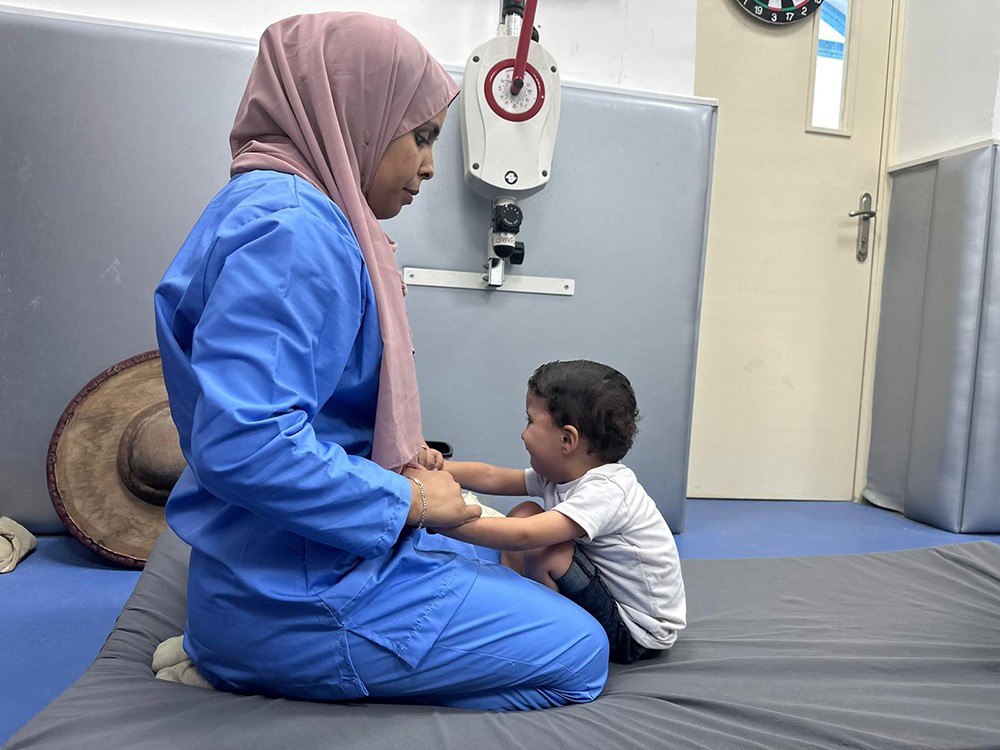Al Ahli Hospital and a year of unspeakable horrors
Today marks one year since Al Ahli Hospital’s Cancer Treatment Centre was hit by rocket fire. This was part of another upsurge in a conflict between Israel and Palestinians that has been ongoing since at least 1948.
The upsurge in conflict, with a Hamas incursion into Israel followed by a larger Israeli incursion into Gaza has seen unspeakable horrors perpetrated against civilians. Many survivors in Gaza ended up at Al Ahli Hospital, run by ABM AID’s partner the Diocese of Jerusalem. Hospital staff found themselves operating, often without even anaesthetics, on children who had been crushed under concrete, torn by shrapnel, or shot. When food was available, staff handed it around to the hundreds of displaced people who gathered for safety in the hospital compound.
ABM AID supporters were quick to help. In October 2023, ABM AID sent funds that were used to keep Al Ahli’s hospital generators running. In February 2024, ABM AID contributed to a broader Anglican program that funded emergency medical care in Al Ahli Hospital.
By February 2024, the economy of the West Bank was in tatters because many who had previously worked in Israel had lost their jobs and many businesses in the West Bank, including those associated with tourism, were struggling. Therefore, the same Anglican program also subsidised some of the medical and education expenses of families affected by economic downturn in the West Bank.
From February to June 2024, the joint Anglican response enabled 1,139 civilians in Gaza to receive emergency medical care from Al Ahli hospital staff. It also enabled 1,584 civilians to receive subsidised medical care and 125 children to receive subsidised education from other institutions run by the Diocese of Jerusalem in the West Bank.
Since June 2024, the extreme violence has been ongoing, with the daily sound of bombs exploding. Displaced Gazans move from camp to camp to escape the bombings, scraping to find food and water in a landscape littered with destroyed buildings. Smaller-scale violence has also erupted in the West Bank between Palestinians and Israeli settlers.
In early September 2024, ABM AID sent further funding to the Diocese of Jerusalem to continue supporting Al Ahli Hospital in Gaza and providing subsidised medical care and education in the West Bank. Medical supply lines to Al Ahli Hospital, mainly through UN agencies, have become more reliable but the hospital is still treating many hundreds of out-patients per day as well as housing 75 in-patients and conducting 25-30 surgeries per day. Our funds contributed towards this treatment.
From mid-September, a long-term conflict between Israel and some groups in Lebanon suddenly escalated. The death toll in Lebanon, mainly from Israeli airstrikes, is now well over 2,000 people, The economies of Israel, Lebanon, and the West Bank have been deteriorating, leading to rising poverty, and the economy of Gaza is almost non-existent. The schools and clinics run by the Diocese of Jerusalem in the West Bank remain open but user-pay fees are drying up, so they are increasingly reliant on external funding.
Amid this suffering, AID acknowledges the human spirit shown by the tireless staff of the Diocese of Jerusalem (including medical workers), by those who have shared their food and living spaces with displaced families, and by those (like ABM supporters) who have contributed from afar.
Ahmed’s story below has ended happily for now, thanks to the dedicated work of the Ahli Hospital.
Ahmed’s Story
The Shuja’iyya neighbourhood, which suffered the most destruction from the occupying forces due to its proximity to the border, was left in dire conditions. Ahmed’s family, who lost their two-story home except for one room unfit for living, was displaced several times under shelling, only to return to the same house. Ahmed’s father was killed in the first week of the war. Water and food were the greatest concerns for every Palestinian in the area.
Ahmed, 35, left the tent he had erected on the ruins of his house when he learned that trucks were distributing flour at the Kuwait Roundabout south of Gaza. Like others, Ahmed walked for over an hour and waited for hours until a cart carrying flour bags arrived. People rushed to it as it was their only hope for flour, but they were surprised by Israeli soldiers shooting from an aircraft. Ahmed was hit in the leg and arms and could not walk. He lay on the ground until someone carried him on a cart pulled by a donkey. The driver mentioned that only Ahli Hospital was operational in Gaza City, and was receiving many injuries daily.
After about an hour, Ahmed arrived at the Ahli Hospital’s emergency room, having lost a lot of blood. A preliminary assessment by the emergency doctor revealed that he needed urgent surgery and possibly a leg amputation due to severe damage to the leg bone. He was quickly admitted to the orthopaedic department, where a specialist decided to proceed with surgery to stop the bleeding. The doctor, aware of the seriousness of the situation, relied on God for the operation.
After the surgery, the doctor exerted every effort to avoid amputating the leg, and the operation was successfully completed. Ahmed spent several days in the hospital, needing long-term physical therapy to recover. The hospital medical staff and doctors provided him with all necessary free treatment and physical therapy. After some time, his condition improved, and he thanked the medical staff, especially the orthopaedic specialist, for their successful surgery and the Ahli Hospital for the quality of healthcare provided and for waiving the service fees.
To learn more about this appeal or to donate, please visit the Appeal page by clicking the button below.
